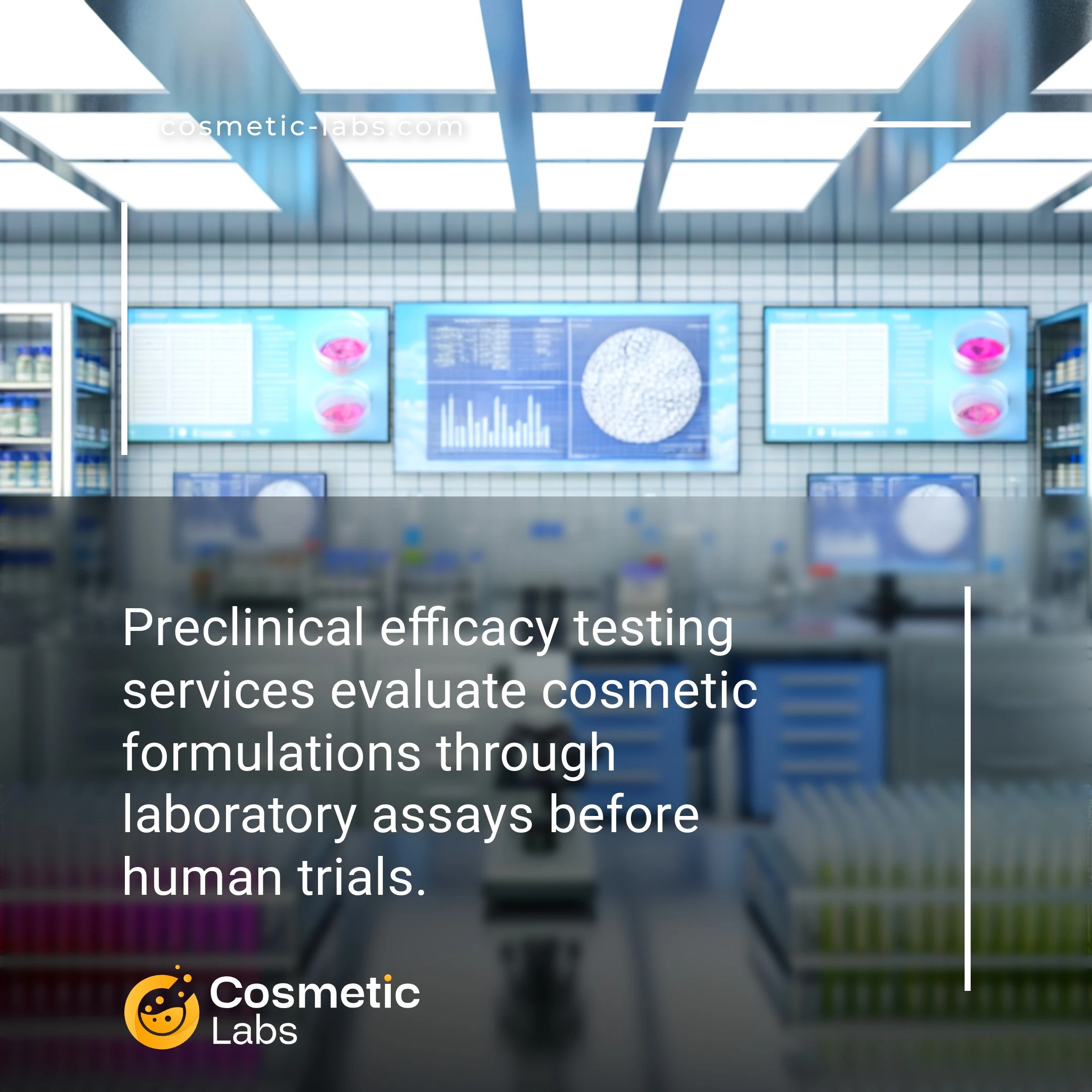Preclinical Efficacy Testing for Beauty Product Development

What is Preclinical efficacy testing?
Preclinical efficacy testing services validate your cosmetic formulations through controlled laboratory studies before human trials begin. Labs conduct in vitro assays and ex vivo testing to measure specific claims like anti-aging, moisturizing, or brightening effects using standardized protocols. These studies generate the scientific data you need for regulatory submissions and marketing claims.
Why do you need this service?
Beauty brands use preclinical efficacy testing to ensure that the active ingredients deliver measurable results by building a strong scientific story that will resonate with the consumers. In competitive markets, substantiated claims backed by laboratory data help avoiding costly reformulations during clinical trials, but also secure retail partnerships and protect against regulatory challenges..
Who provides Preclinical efficacy testing services?
All cosmetic labs providing Preclinical efficacy testing services
There is no company providing these services at the moment.
Preclinical Efficacy Testing Services
Preclinical efficacy testing validates your cosmetic formulations before human trials, providing the scientific evidence needed to support product claims. Labs on our platform offer specialized testing protocols that measure ingredient performance, stability, and biological activity through controlled laboratory methods.
In Vitro Testing Methods
Labs use cell cultures and tissue models to evaluate how your formulations interact with skin cells. These tests measure antioxidant activity, collagen synthesis, and cellular uptake without human subjects.
Common in vitro assessments include:
- Fibroblast proliferation assays for anti-aging claims
- Melanogenesis inhibition tests for brightening products
- Barrier function analysis using reconstructed skin models
- Antimicrobial efficacy against specific pathogens
Results typically arrive within 2-4 weeks and provide quantitative data you can use in marketing materials.
Biomarker Analysis and Molecular Testing
Advanced labs measure specific proteins, enzymes, and genetic markers that indicate your product’s biological impact. This molecular-level testing creates stronger scientific backing for cosmetic claims.
Key biomarker tests include:
- Hyaluronic acid production measurement
- Matrix metalloproteinase activity assessment
- Inflammatory cytokine response evaluation
- Gene expression profiling for active ingredients
These tests cost between $500-$2,000 per assay depending on complexity. Connect with labs on our platform to discuss which preclinical tests best support your product development goals.
18 subcategories of Preclinical efficacy testing services
There are no results matching your search
Practical Applications of Preclinical Efficacy Testing Services
Preclinical efficacy testing applications validate product performance claims before human trials, reducing development costs and regulatory risks for beauty brands.
Multi-Claim Validation Approach
Hydration and Barrier Function
Transepidermal water loss (TEWL) measurements and hyaluronic acid production assays validate moisturizing claims. Reconstructed skin models assess ceramide synthesis and barrier integrity improvements, providing data for hydration and skin protection claims.
Melanogenesis inhibition tests measure tyrosinase activity reduction and melanin transfer blocking. These protocols support claims for dark spot reduction, skin tone evening, and radiance enhancement across different skin types.
Cytokine profiling and inflammatory marker assessments validate calming claims for sensitive skin products. Labs measure reductions in IL-6, IL-8, and TNF-α to substantiate soothing and redness reduction benefits.
Co-culture models evaluate how products support beneficial skin bacteria while inhibiting pathogenic strains. These tests validate prebiotic claims and microbiome-balancing properties increasingly demanded by conscious consumers.
| Test Type | Duration | Key Metrics | Typical Applications |
|---|---|---|---|
| Cell Viability | 24-48 hours | Minimum effective concentration | Acne treatments, cleansers |
| Gene Expression | 3-7 days | Enzyme activity | Active ingredient validation |
| Protein Analysis | 2-5 days | Enzyme activity | Targeted treatments |
| 3D Skin Models | 7-14 days | Tissue response | Complex formulations |
| Microbial Balance | 5-10 days | Flora diversity | Microbiome products |
Ready to validate your product’s performance claims? Contact specialized cosmetic labs on our platform to discuss preclinical testing protocols that match your formulation goals and target market requirements.
